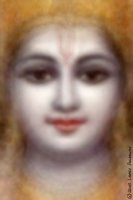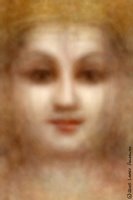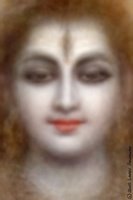For the supreme, it can be said, “thou art the woman; the man; the youth; the maiden. Thou face all directions." He is not visible; He can only be known with the heart; the mind. Those who know him this way become immortal. He is the Universal God who Himself is the Universe which He includes within His own self. He is the light within us. He is the Supreme Being whose shadow is life and death.
The Supreme is Immutable and the Unthinkable. He is the source of all that is, He is himself immovable. The Eternal Reality not only supports His existence but also is the active power is the world. God is both transcendent, dwelling in light, inaccessible, yet "more intimate to the soul than the soul itself. The Supreme is at once the transcendental, the cosmic and the individual reality. In its transcendental aspect, it is pure self, unaffected by any action or experience, detached, unconcerned. In its dynamic aspect, it not only supports but governs the whole cosmic actions and this very Self which is one, all in all, above all; is present in all individuals.
If the universe consists of thinking individuals, who can be influenced but not controlled, for God is not a dictator, conflict is inevitable. The world consists of free spirits meaning that evil is possible and probable. One cannot seek truth, beauty and goodness if there is no evil, error or ugliness.
Without negativism, there can never be positivism. For the Gita, the world is scene of an active struggle between good and evil. As God is completely good, His love is boundless, He is concerned about the suffering of the world. God is omnipotent as there are no external limits to his power. The social nature of the world is not imposed on God, but is willed by Him. The law of Karma does not limit the omnipotence of God. The reign of law is the mind and will of God and cannot be regarded as a limitation of His power.
The emphasis of the Gita is on the Supreme as a God who is close to us at a personal level. He resides in everyone's heart, God stirs our heart, grants our prayers; He is the source and sustainer of values. We can seek Him on a personal level only by our faith, worship and prayers.
He is responsible for creation, preservation and dissolution of the universe. He has both higher and lower values. The living represents the higher and material medium, the lower. God is responsible for the ideal plan and the concrete medium through which the ideal becomes actual, the conceptual, the cosmic. God is at the same time, wisdom, love and perfection.
![]()
![]()
![]()







